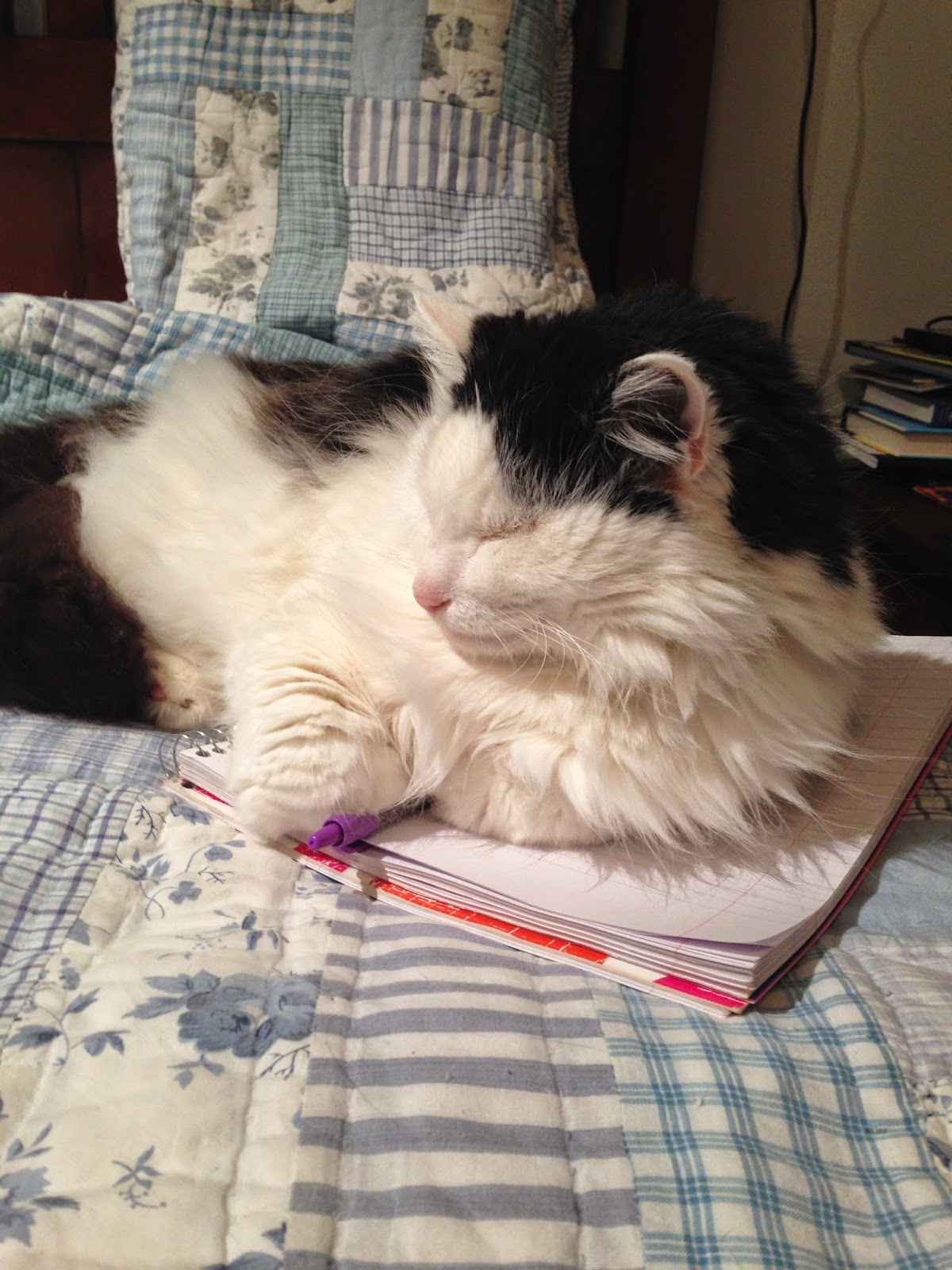I've been working on editing two books for the past few months, so I've been in the thick of the self-editing process a lot lately. Since I'm a hand writer in the rough draft stage, my first step is to type my manuscript. It becomes my first pass edit because I fix small errors in spelling and clarity, but I don't make any major changes to the document. I may not even make chapter breaks at that stage. I still work in Word. I've tried Scrivener twice and I just can't handle it. Besides, publishers and agents want a Word document, so why would I create more work for myself?
And I'd just like to point out here, I am NOT an English teacher. I want you to disregard all grammar rules in the early stages! That comes much, much later. Don't bog your creative process down with that now.
Step 1
As I'm sure you've probably read before, the first step in the editing process is to write "the end" on the rough draft and set it aside for 4-6 weeks. Yep. Don't do a thing with it! Go relax, take naps, read fiction. Enjoy your break and your accomplishment.
In some ways, having two projects going at once actually helps me. I can ignore one project while it gels and still be productive on another project. And they're completely different genres, so there's no trouble with mixing things up.
After a project sits a while and you haven't been picking at it, open it up again. I like to print the entire thing out and read through it on paper. I know some people can work entirely on the screen, but I struggle. Hard copy is best for me and I can write lots of notes in the margins of things that need to be done. Now is NOT the time for making grammar edits, sentence structure edits, or punctuation corrections. Sure, you can fix little things as you go along if they're obvious, but I figure that's what spell check is for. Now is the big picture overview time. Look for holes in your plot, things that don't make sense, characters that don't ring true, descriptions that are too much or too little. Hopefully, you outlined the project before you started, but if you didn't, you'd better do it now. That character arc needs to be there, the climax needs to be in the right place, and the three act structure should be solid. Look for showing vs. telling. If the telling gets to be too much, make a note to fix it.
Ask yourself, is my theme clear? Did I convey the emotion or the message I wanted to get across? If you don't know what your theme is, look to see what themes have come out in the manuscript. Are they what you intended? If not, you know what to do. Make notes in all the places in the document where you could improve it.
Step 2
Write some more. If you're like me, you skipped writing some scenes the first time around that could improve the flow of your story. Go back and write those scenes now. Fill in the blanks. Because I write so spare to begin with, I'm not usually one of those writers that has to cut a lot of text, but I know a lot of people do have to make cuts. To do that, examine each individual scene and ask yourself - Does this move the story plot along? If not, cut it. Ask am I repeating myself, i.e. making characters illustrate things that have already been demonstrated earlier in the manuscript? Then cut that. Do I have long passages of description that don't illustrate character or plot? Trim that down. Obviously, many published authors do all of these things and get away with it. This is where your art comes in. Your skill at determining how much is too much and how much is enough, is what makes the work uniquely yours.
This step can take a long time. If you like to be organized and give yourself deadlines, pull out a calendar and mark the dates by which you'll have each chapter completed. I find having that goal written on a calendar helps me stay on track. Make all your writing changes (I like to work by chapter), run another spell check, and print a new draft.

Step 3
This is the one I struggle with - the beta read. This is when you're ready for another pair of eyes to see it. I personally don't think it's all that useful to show anyone your rough draft work. They'll just start nit picking your grammar and it won't be very productive or encouraging for you. The only person I might show early work to is another writer or a very close friend who isn't going to shoot me down before I've even begun. That said, you do need some fresh eyes and the opinion of someone who's never seen your opus. Where I struggle is finding that person. I live in a rural area with no writer's critique group nearby. Asking a non-writer to read for you is tricky because it's a BIG favor you're asking. You need someone who loves to read and reads a lot and who can read for the big picture again.
Many people, writers included, think you're asking for grammar edits at this stage. Beta readers PLEASE don't waste your valuable time on grammar edits. Again, look for plot holes, things that don't make sense, repeated phrases or annoying things like stereotypical cardboard characters. Point out anything that jars the reader out of the imaginary world the author is building. And try to do it quickly. I know that's asking a lot, but you have no idea how badly you've got the poor writer on pins and needles waiting for your thoughts. They'll love you forever if you can do all this quickly.
Writers, once you get your beta reader's thoughts back, take a look at them. You may be offended or upset by them, but remember they might be saving you from an even bigger disappointment from your eventual readers. You don't have to agree with everything they've suggested, but you should at least consider their ideas. If it's not clear to them, chances are it won't be clear to others either. This can be an emotional time. It doesn't hurt to set the manuscript aside again and wait on it. Let it gel a bit. Give yourself time to process, reboot, and come back with a clear head. Then go back to Step 2
Step 4 (2)
Yep. Go back to all the places the beta reader pointed out that needed something and fix them if necessary, just like you did in Step 2 with your own comments. This may involve writing new scenes again, or rewriting the ones you already have. Make a schedule and due dates if you need to. Make all the changes, do another spell check, and print a new draft. Whew!
Step 5
A lot of people never make it this far. They get discouraged or distracted, so if you've made it here, pat yourself on the back. Nice work!
That said, Step 5 is scary. It's query time.
Do all the grammar/punctuation/spelling edits that I told you to ignore at the beginning. Like I said, you can do them all along as you come across them, but it never hurts to do one last polish. The reason for leaving them until the end is because there's no sense wasting time on it if you're just going to cut or rewrite that passage anyway. Then, you need to prepare a pitch, a query letter, and a synopsis because it's time to put it out to agents and/or publishers.
Many writers get stuck in the feedback loop between Step 3 and 4. They keep going back to their betas for approval instead of moving forward. I think they must be operating under the assumption that it has to be perfect and will never be changed again once it goes to a publisher. I'm here to tell you, your book will be edited again many times after it's accepted for publication, so you're wasting time. Your work should be polished and presentable with all major errors fixed when you query, but it ain't gonna be perfect. Get over it. :)
Now, go write!




















































